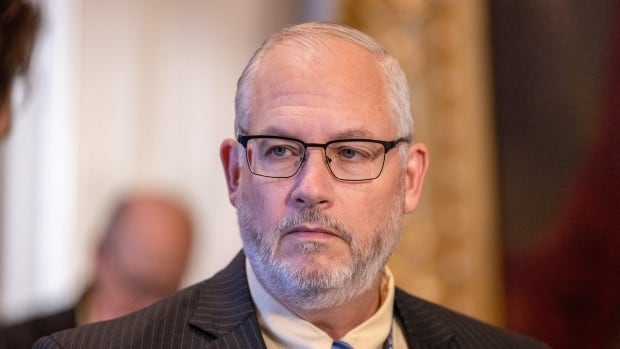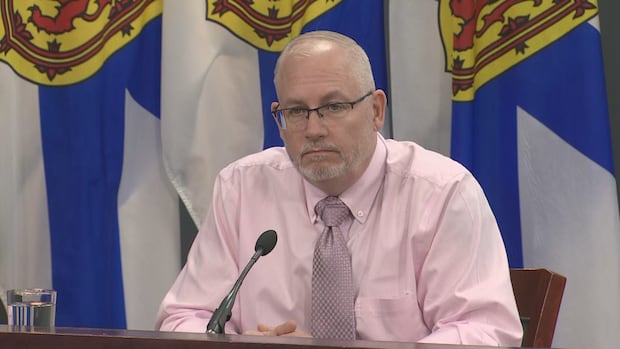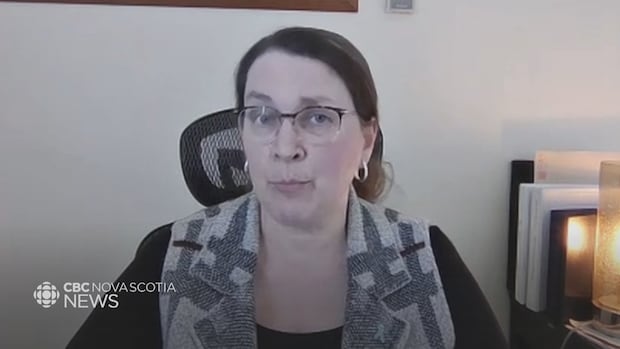
Dozens of emails expressing outrage, disgust and disappointment poured into the inboxes of Nova Scotia’s premier and justice minister after Brad Johns said he didn’t consider domestic violence an epidemic, and he now says that reaction influenced his resignation from cabinet.
Records released under freedom of information legislation provide a glimpse into how the public responded when Johns made the comments during a news conference on April 18, the fourth anniversary of a shooting rampage that claimed the lives of 22 Nova Scotians.
Premier Tim Houston immediately said he disagreed and Johns issued an apology later that day. The following night Houston announced in a statement that Johns was stepping down as justice minister.
The initial comments and Johns’s apology elicited responses from people who identified as survivors of intimate partner violence as well as some who said they were PC Party supporters and critical of Johns’s actions. Only two out of about 40 emails were supportive.
“I am struggling to understand how the person responsible for the department meant to hold perpetrators accountable and protect victims of violence felt it was appropriate to dismiss the harsh reality for so many Nova Scotians, and Canadians,” wrote one person who identified as a victim “navigating the justice system.”
“You obviously went off-script and voiced your personal beliefs,” another person wrote to Johns. “You have been in politics far too long to have had such a novice lack of judgment.”
Nova Scotia Justice Minister Brad Johns was asked by reporters Thursday, the fourth anniversary of a deadly rampage that claimed the lives of 22 Nova Scotians, about recommendations made by the joint federal and provincial inquiry into the tragedy. It called for change to end the epidemic of gender-based violence.
People’s reactions, and the conversations he had with organizations focused on preventing gender-based violence, impacted his decision to resign, Johns told CBC News.
“I know that it upset and hurt people. I called and I apologized. When it became apparent that not everybody was willing to accept or believe the apology, I felt it was important to step back,” Johns said in an interview.
“I certainly by no means meant to downplay the impact socially of domestic violence and the importance of putting resources and time and commitment towards that.”
Reflecting three months after his comments, Johns said he had taken issue with the term “epidemic” and now realizes he shouldn’t have tried “to split the hairs on the definition of it.”
“I didn’t really like the wording of using the word epidemic,” he told CBC. “What I probably should have recognized and just said was that that’s how the Mass Casualty Commission defines it. So that’s the definition.”
The emails released to CBC show some people called for his resignation, while others implored the premier to fire Johns.
“Please handle this situation as a business leader would,” wrote a woman who told Houston she had admired his leadership.
She went on to say it was “incredibly hurtful … to see the blatant disregard by a man [Johns] who is employed by the taxes I, and others, pay. His position is a gift to him, and a great responsibility, and he has squandered it.”
Johns’s mistake ‘cost him’
Another writer told the premier they would lose confidence in his leadership if Johns stayed on as minister.
A person who identified as being a PC supporter said “a minister of justice cannot throw away factual information and the advice of experts and replace it with their own ignorant opinion.”
The writers’ names were redacted.
When asked what impact the feedback had on Houston’s decision to accept Johns’s resignation, the premier’s office reiterated that it takes domestic violence “very seriously.”
“We’re a government that listens. MLA Johns made a mistake and it cost him,” said a statement from Houston’s office.
Johns didn’t read full MCC report
Among the people who emailed Johns and Houston were several who said they were part of the Mass Casualty Commission process, the joint provincial and federal inquiry into the deadly 2020 rampage that started when a gunman viciously attacked his spouse.
The commission’s final report detailed years of violence the perpetrator committed against women. It called for sweeping changes to end gender-based violence and said recognizing it “as an epidemic is a valuable first step.”
“Johns’s words are a violent slap in the face for our monumental efforts, and brand your government as misogynist,” said one email.
Sarah Rodimon, executive director of Avalon Sexual Assault Centre in Halifax, wrote the premier and said the comments showed Johns either “failed to read” the final report “or worse, that he read the report and has willingly disregarded its findings.”
In an interview, Johns confirmed he did not read the full MCC report, but that he read 70 pages of summaries his staff provided him. He said he had no plans to read it now that he’s no longer minister.
Anita Stewart, executive director of the Antigonish Women’s Resource Centre and Sexual Assault Services Association, says Brad Johns is welcome to visit her centre to get educated on the pervasiveness of domestic violence.
Included in the public records are the apology emails Johns sent to 37 community organizations the evening after his comments. Some responded by inviting him to tour women’s and homeless shelters. Others wrote back requesting more support.
For instance, Margaret Mauger, a registered counselling therapist with the After Trauma Empowerment Network, asked if there was a way to apply for funding for an additional therapist to meet demand in the community and her organization’s waitlist.
Coverdale Justice Society said they previously reached out to the province for funding and “these communications have yet to receive the attention they warrant.”
Johns said he spent much of the day after his comments calling people — committing to learn more and to visit their organizations.
“About 20 per cent … just didn’t seem like they had any faith or support in what I was saying,” he said.
Resigned on Friday night
The records released to CBC include several pages of internal government correspondence redacted because they contained advice to the minister, one of the exemptions under freedom of information legislation.
Barbara Emodi, a former NDP staffer and political analyst who contributes to CBC Radio’s Mainstreet Halifax, said behind the scenes, staffers would have been directing Johns on who to call and looking at the public’s reaction.
Emodi said when she taught crisis communications she always stressed the need to take prompt action during a political controversy.
Waiting more than 24 hours to resign is unusual, she said, and often reflects a reluctance to do so.
“The honourable thing in politics is to resign immediately so it doesn’t tarnish your boss, so it doesn’t tarnish the party and your policies,” she said.
“The longer you wait, the more you’ve created a vacuum for other negative things to happen.”
Johns, who plans to run for re-election, said he was “absolutely not” fired and people “very rarely” bring up his comments.
The premier’s office said Johns “understands the gravity of the comments he made and has been working to make amends.”



